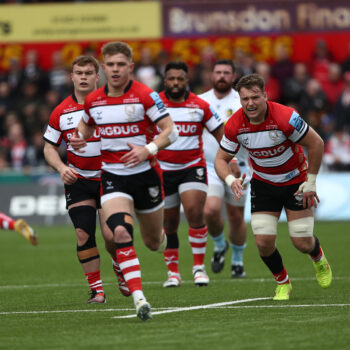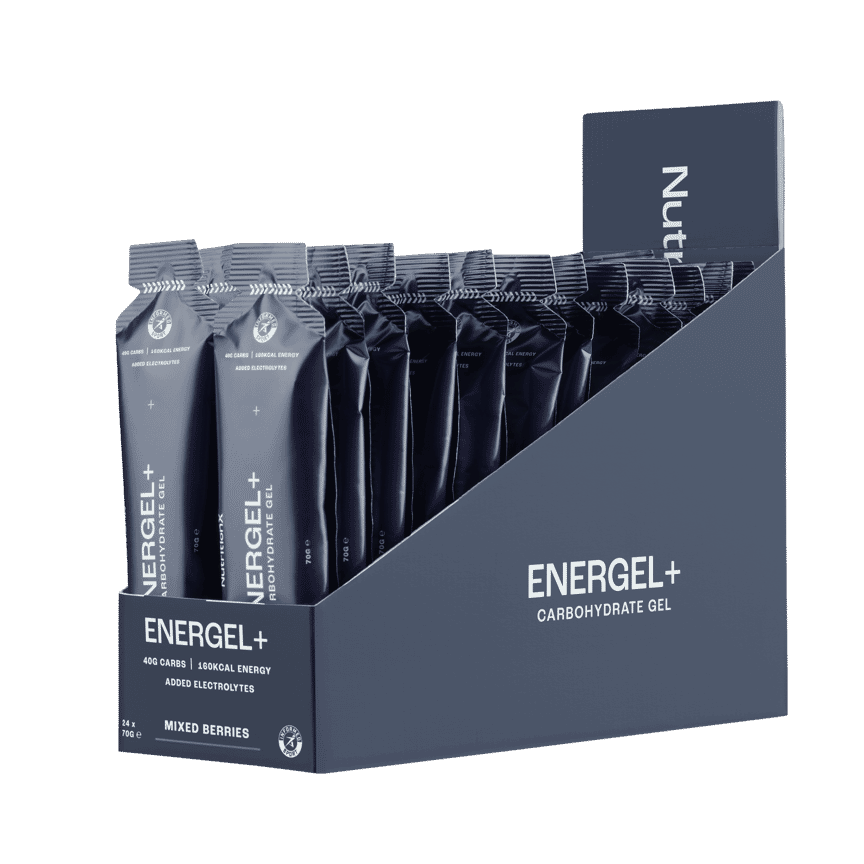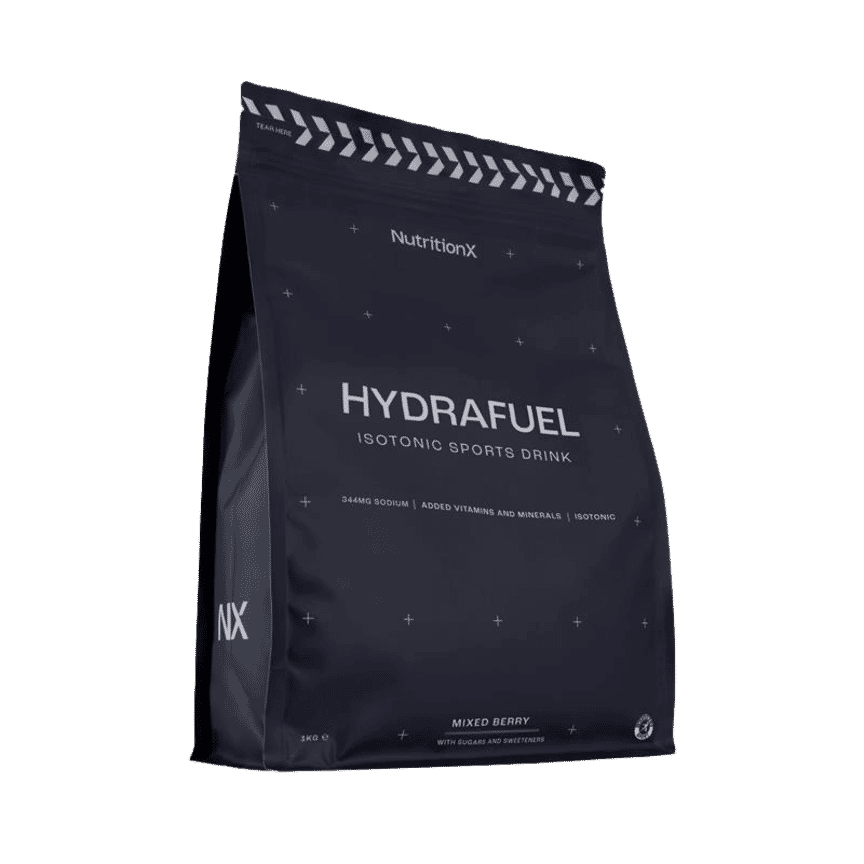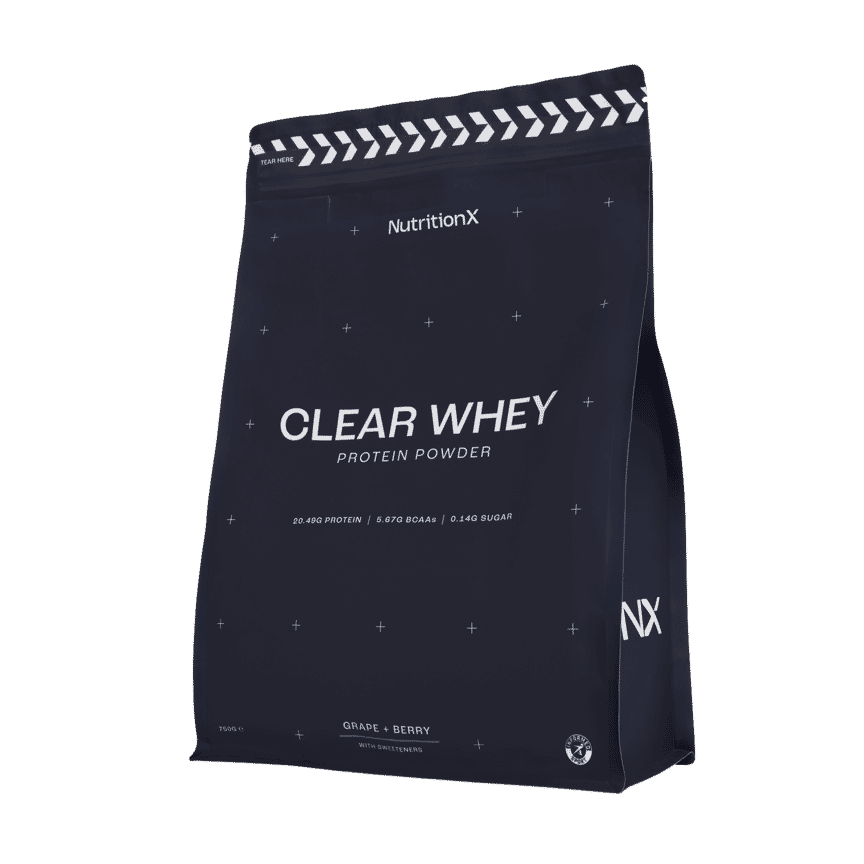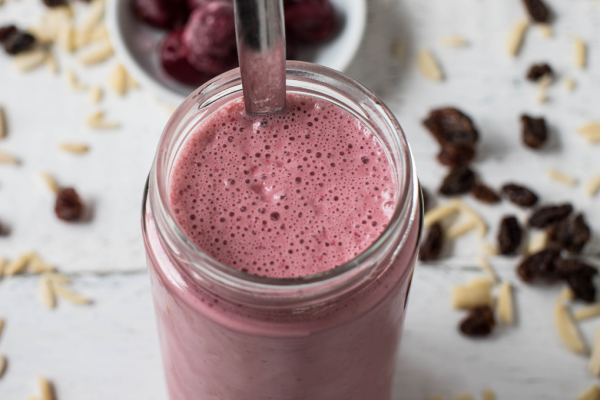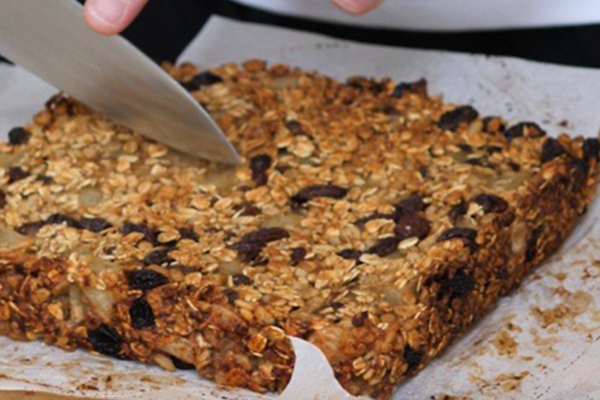What does a busy match schedule look like in team sport?
As the winter season hits peak flow for sports such as rugby union and football and festivities affect match schedules, this often results in very busy weeks for clubs; multiple matches, short gaps and only a few days between games for athletes to recover, prepare and go again.
In football, we will see midweek and weekend games, meaning players may compete Saturday, Wednesday and again the next Saturday. Rugby union has thankfully restricted these midweek games more recently, but you may still see a team play on Sunday and back straight up to the following Friday night.
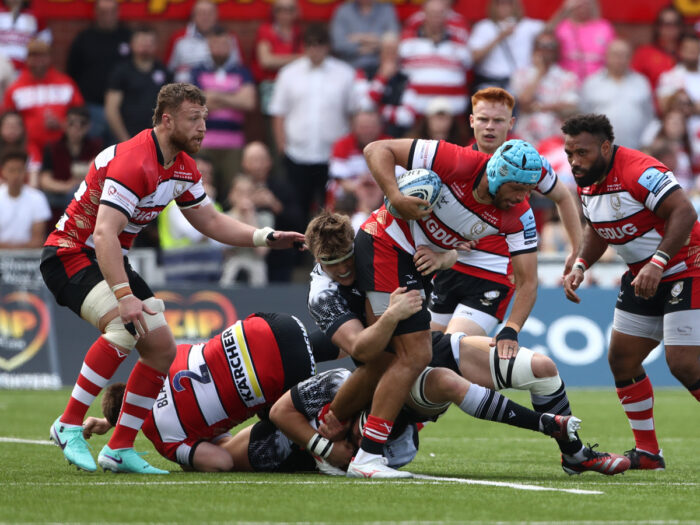
What does training look like during a busy match period?
With such short breaks between fixtures, the bulk of the preparation on-field is light and the tactical and technical areas of the sport will be covered, whilst the physical prep won’t be too extensive. However, whilst the physical load between matches may be lower, the energy requirements of recovery can be very high and nutrition can play a crucial role in consistently being able to perform.
What nutrition considerations should you take into account during a busy match week?
There are several things to consider when it comes to nutrition that effectively supports players during busy match schedules, on matter what your sport.
Consideration #1 - ‘FUEL UP’
It is well established that the day before match play (GD-1) is crucial to increase our muscle and liver stores of carbohydrate, which we call glycogen. To do this, rugby players are guided to consume approximately 6g/kg body mass of carbohydrate, which translates into 500-700g of carbohydrate. The guide for footballers is 6-10g/kg body mass carbohydrate, which - for the lower body mass of footballers of approx. 70-80kg - means the absolute amount is pretty similar in the 500-700g region.
To meet these high amounts, being tactical with our choices is key. To make it easier, picking lower fibre, higher glycaemic index (G.I.) sources such as white breads and bagels, white pasta, jasmine or sushi rice, are ideal. If there is any light training on this day, providing higher carbohydrate drinks such as HydraFuel also makes it easier to keep that flow of fuel coming in. Carbohydrate-based ‘shots’, like the new Carb Shot, also make it easier than ever to keep those carb levels up whilst on the go.
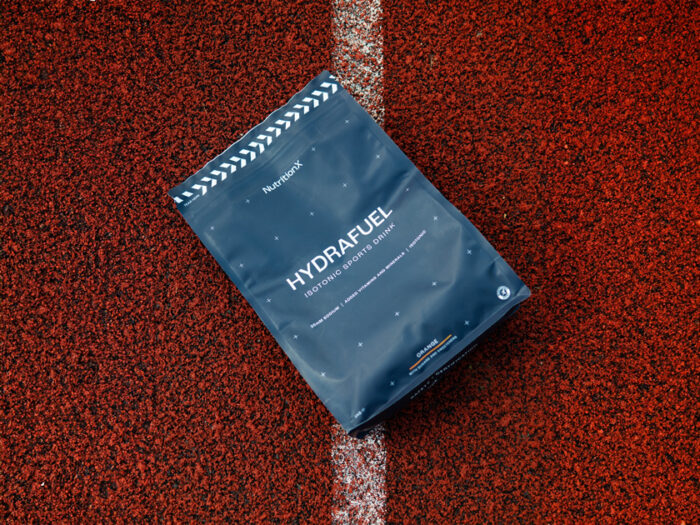
Consideration #1 - ‘PERFORM’
Gameday needs a top up of fuel at breakfast to make sure the tank is full after an overnight fast. Fruit smoothies are a great option here, combined with oat-based carbohydrate options such as porridge or overnight oats. The pre-match can be your normal routine again, high in comfortable carbohydrate choices. In-match, though, the provision of fuel to support your fuel tank is vital to maintain intensity throughout 80, 90, or potentially even 120 minutes of match-play if there is the possibility of extra time. Using a carbohydrate drink like HydraFuel or the Carb Shot in combination with an energy gel such as Energel+ can meet the target of 30-60g carbohydrate each hour of match play and are easy to consume on the pitch.
Consideration #3 - ‘RECOVER AGGRESSIVELY’
Post-match, the first 3 hours need to provide opportunities to begin the process of refilling the tank. Trying to consume approximately 100g carbohydrate each hour, three times, will go a long way to doing this which can be especially important if the next match is only a few days away. This can be achieved with liquids and smoothies. HydraFuel or the Carb Shot can again be useful to replace fuel and fluids, but smoothies made with a recovery powder such as MRM or Clear Whey protein incorporating fruit juice can also be a popular choice.
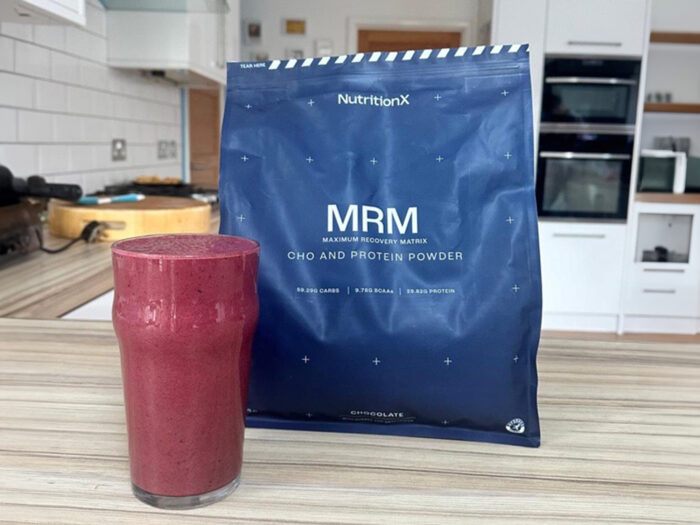
Consideration #4 -‘Game Day +1’
The day after the game arrives will often see some soreness and a few tired bodies. There may be some light active recovery activities, but despite a low workload, the energy needs of both rugby players and footballers is higher in recovery as has been shown in recent research (Hudson et al., 2020; Carter et al., 2023). This means despite only light activities, we need to incorporate high carbohydrate meals into the day, at similar levels to GD-1. This is to restore the fuel tank so it is not too low leading into the fast approaching next match, but also to provide energy for the recovery processes going on in the body. Again, liquid meals and smoothies can be a useful way of meeting these needs when you might not have the appetite to do so!
What supplements can support busy match schedules?
We have already mentioned the application of isotonic sports drinks, carbohydrate shots and energy gels around match play to hydrate and provide the needed fuel for preparing and performing on gameday. The addition of MRM or Clear Whey Protein in smoothies together with milk, fruit juices and frozen fruit blends can provide the carbohydrate needed, but also portions of protein approximately 20-30g in size may further promote the storing of that carbohydrate; providing the building blocks to repair damaged muscles.
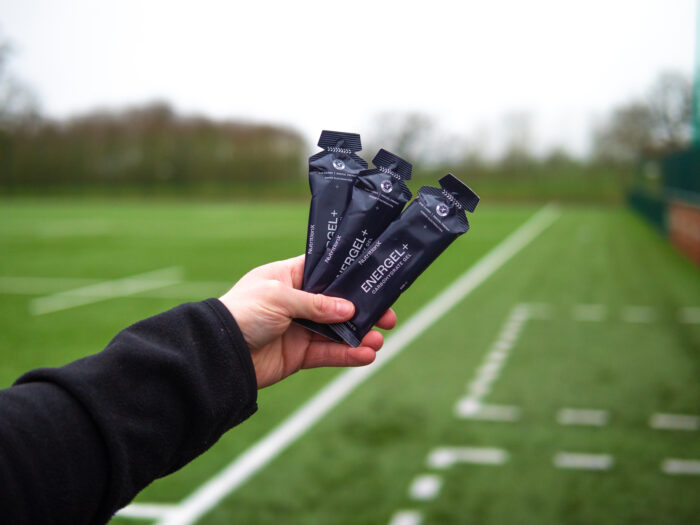
This damage is due to the many accelerations and decelerations from high intensity running in team sports, but also due to the collisions in contact sports, especially in both codes of rugby, causing high levels of muscle soreness. Including sources of omega-3 fatty acids in the daily routine from sources such as oily fish or supplements may both reduce the markers of muscle damage and reduce soreness levels after exercise. This likely needs to be consistent to see the best results, so including those food sources can be supported with Daily Omega-3 capsules each day especially during periods of regular match play.
Lastly, but also importantly, anything we can do to support this ‘re-filling’ of our fuel tank and getting our muscles to store as much as glycogen effectively will aid subsequent performances during quick turnarounds to the next match. Creatine supplementation may aid this by improving uptake and transport of carbohydrate into the muscles. Adding in 3-5g creatine powder per day consistently through heavy match periods may provide further benefit to recovery in this way.
What challenges do busy match schedules pose for athletes?
Obviously there is a lot of food to consume to ensure optimum performance during busy periods, so keeping options fresh and varied is important. There can be travel involved as well, so picking choices that are portable and eat well cold can make the whole practice realistic. Having the appetite for it can be tough, so using liquid meals and snacks can also make life a lot easier!
Below gives you an idea of what a day might look like in food to hit 600g carbohydrate.
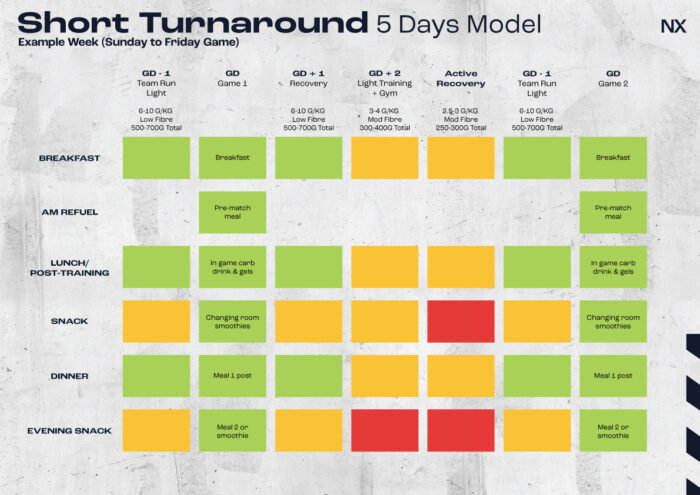
The week as a whole with two quick games needs to be planned, too, for athletes to stick to, so the week framework using a simple colour code of traffic lights gives an overview of what that might be (RED – lower carb( 0.5g/kg), YELLOW – moderate carb (0.75-1.0g/kg) and GREEN – high carb (1.0-1.5+g/kg) is the key to the colours.
Carter, J.L., Lee, D.J., Perrin, C.G., Ranchordas, M.K. and Cole, M. (2023) Significant Changes in Resting Metabolic Rate Over a Competitive Match Week Are Accompanied by an Absence of Nutritional Periodization in Male Professional Soccer Players. International Journal of Sport Nutrition and Exercise Metabolism, 33 (6), 349-359.
Hudson, J.F., Cole, M., Morton, J.P., Stewart, C.E. and Close, G.L. (2020) Daily Changes of Resting Metabolic Rate in Elite Rugby Union Players. Med Sci Sports Exerc, 52 (3), 637-644.



